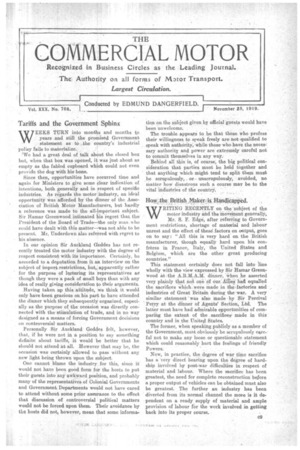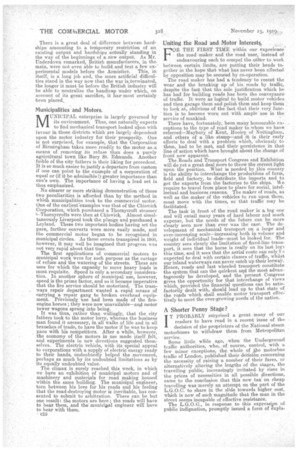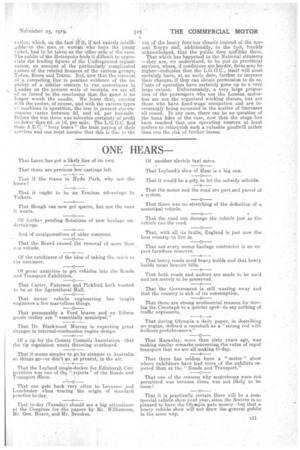Tariffs and the Go v ernment Sphinx EEKS TURN into months and
Page 1

Page 2

Page 3

If you've noticed an error in this article please click here to report it so we can fix it.
months to years and still the promised Government statement as to the country's industrial policy falls to materialize.
"We had a great deal of talk about the closed box but, when that box was opened, it was just about as empty as the fabled cupboard which could not even provide the dog with his bone.
Since then, opportunities have occurred time and again for Ministers to give some clear indication of intentions, both generally and in respect of specific industries. As re-gards the motor industry, an ideal opportunity was afforded by the dinner of the Association of British Motor Manufacturers, but hardly a reference was made to the all-important subject. Sir Hamar Greenwood intimated his regret that the President of the Board of 'Trade—the only man who could have dealt with this matter—was not able to be present. Mr. Underdown also referred with regret to his absence.
In our opinion Sir Auckland Geddes has not recently treated the motor industry with the degree of respect consistent with its importance. Certainly, he accorded• to a deputation from it an interview on the subject of import restrictions, but, apparently rather for the purpose of leAuring its representatives as though they were a pack of small boys than with any idea of really giving consideration to their arguments.
Having taken up this attitude, we think it would only have been gracious on his part to have attended the dinner which they. subsequently organized, especially as the purpose of the occasion was directly connected with the stimulation of trade, and in no way designed as a means of forcing Government decisions on controversial. matters.
Personally Sir Auckland Geddes felt, however, that., if he were not in a position to say something definite about tariffs, it would be better that he should not attend at all. However that may be, the occasion was certainly allowed to pass without any new light being thrown upon the subject.
One cannot blame the industry for this, since it would not have been good form for the hosts to put their guests into any awkward position, and probably many of the representatives of Colonial Governments and Government Departments would not have cared to attend without some prior assurance to the effect that discussion of controversial political matters would not be forced. upon them. Their avoidance by the hosts did not, however, mean that some informa tion on the subject given by official guests would have been unwelcome. . '
The trouble appears to be that those who profess their willingness to speak freely are hot qualified to speak with authOrity, while those who have the neees-;sary authority and power are extremely careful not to commit themselves in any way.
Behind all this is, of course, the big political consideration that parties must be held together and that anything which .might tend to split them must be scrupulously,., or , unscrupulously, avoided, no matter how disastrous such a course may be to the vital industries of the country.
How. the British Malstri is; Handicapried.
WRITING RECENTLY on the -subject of the motor indifstry and the moiernent generally, Mr. S. F. Edge, after referring to Government restrictions, shortage of material and labour unrest and the effect of these' factors on output, goes on to say: "All this is very hard on the British manufacturer, though equally hard upon his confreres in Franco, Italy, the United States and Belgium, which are the other great producing countries."
This statement certainly does not fall into line wholly with the view expressed by Sir Hamar Green.wood at the A.B.M.A.M: dinner, .irhen he asserted very plainly that no one Of dur.:Altes had equalled the sacrifices which were made in the.factories and industries of Great Britain during the .war. A very similar statement ' was also made by Sir Percival Perry at the dinner of Agents' Section, Ltd. The latter must have bad admirable opportunities of comparing the extent of the .saerificesmade in this country and in the United States.
The former, when speaking publicly as a member of the Government, must obviously be scrupulously careful not to make any loose or questionable statement which could reasonably hurt the feelings of friendly Powers.
Now, in practice, the degree of war time sacrifice has a very direct bearing upon the degree of hardship involved by post-war difficulties in respect of material and labour. Where the sacrifice has been greatest, the need for complete reconstruction before a proper output of vehicles can be obtained must also be greatest. The further an industry has Leen diverted from its normal channel the more is it dependent on a ready supply of material and ample provision of labour for the work involved in getting back into its proper course. There is a great deal of difference between hard-, ships amounting to a temporary restriction of an existing output and hardships actually standing in the way of the beginnings of a new output. As Mr. Underdown remarked, British manufacturers' in the . main, were not even able to build and test a few experimental models before the Armistice. This, in itself, is a long job and, the more artificial difficulties stand in the way now that the war is.terminated, the longer it must be before the British industry will he able to neutralize the handicap under which, on account of its great sacrifice, it has most certainly , been placed. .
Municipalities and Motors.
MUNICIPAL enterprise is largely governed by its environment. Thus, one naturally expects to find mechanical transport looked upon with favour in those districts which are largely dependent upon the motor industry for their prosperity. One is not surprised, for example, that the Corporation of Birmingham takes more readily to the motor as a means of removing its refuse than does a purely agricultural town like Bury St. Edmunds. Another foible of the city fathers is their liking for precedent. It is so much easier to justify a departure from custom if one can point to the example of a corporation of equal or (if it be admissible!) greater importance than one's own. The importance of having a lead set is thus emphasized. No clearer or more striking demonstration of these two peculiarities is afforded than by the method in which municipalities took to the commercial motor. One of the earliest exampleswas that of the Chiswick Corporation, which purchased a Thornycroft steamer –Thornycrofts were then at Chiswick. Almost simultaneously Liverpool took the plunge and purchased a Leyland. These two important bodies having set the pace, further converts were more easily made, and the commercial motor began to be recognized in municipal circles. As those events transpired in 1900, however, it may well be imagined that progress was not very rapid about that time. The first applications of commercial motors to municipal work were for such purpose as the cartage of refuse and the watering of the streets. These are uses for which the capacity to move heavy loads is most requisite. Speed is only a secondary consideration. In another sphere of municipal use, however, speed is the prime factor, and so it became imperative that the fire service should be motorized. The tramways repair department wanted a rapid means of carrying a repair gang to broken overhead equipment. Pieviously use had been made of the fireengine horses ; they were now unavailable—and motor tower wagons sprang into being. It was thus, rather than willingly, that the city fathers took to the motor lorry, whereas the business man found it necessary, in all walks of life and in all branches of trade, to have the motor if he was to keep pace with his competitors. After a while, however, the economy of the motors in use made itself felt, and experiments in new directions suggested themselves. The electric vehicle, with its special appeal to corporations with a supply of electric energy ready to their hands, undoubtedly helped the movement, perhaps as much by its undoubted limitations as by its equally undoubted value. The climax is surely reached this week, in which we have an exhibition of municipal motors and of machinery and materials for road making housed within the same building. The municipal engineer, torn between his love for his roads and his feeling that the road-destroying motor is inevitable, has consented to submit to arbitration. There can be but one result: the motors are here ; the roads will have to bear them, and the municigal engineer will have to bear with them. el0
Uniting the Road and Motor Interests,.
FOROR THE FIRST TIME within our experience' road maker and the road user, instead of endeavouring each to compel the other to work between certain limits, are putting their heads together in the hope that what has never been effected by opposition may be secured by co-operation. The road maker has had a. tendency to resent the wear and the breaking up of his roads by traffic, despite the fact that the sole justification which he has had for building roads has been the conveyance of traffic. It were as logical to build motor vehicles and then garage them and polish them and keep them to look at, oblivious of the fact that their very func tion is to become worn out with ample i use n the service of mankind. , There have, fortunately, been many honourable ex, ceptions to the type of road maker to whom we have referred—Maybury of Kent, Hooley of Nottingham, and others of a like stamp—and it is their early efforts to deal with a problem which, obviously to them, had to be met, and their persistence in that line of 'action which have brought about the change of front' now apparent. The,Roads and Transport Congress and Exhibition will do yet a great deal more to throw the cbrrect light upon the position. What is needed by this country is the ability to interchange the productions of farm, field and factory, to distribute the imports and to get the exports from the factories to the ships. Me require to travel from place to place for social, intellectual and business reasons. The maker of roads, as well as the Maker of the vehicles to run upon them, . must move with the times, so that traffic may be facilitated. The task in front of the road maker is a big one and will entail many years of hard labour and much expense, but the needs of the future can be more clearly seen now than ever was the case. The development of mechanical transport on a large and ever-increasing scale—increasing both in volume and weight of individual loads—must be looked for. The country sees clearly the limitation of fixed-line transport, it sees that the horse is really on its last legs this time, -and it sees that the aerial route can'only 'be expected to deal with certain classes of traffic, whilst our inland waterways can never, catch up their leewas. Hence, roads and fast wheeled transport constitute the system that can the quickest and the most advantageously be developed, and the present Congress gives the opportunity for that interchange of views which., provided the financial questions can be satisfactorily dealt with, should, lead up to that state of the roads which shall enable motor transport effectively to meet the ever-growing needs of the nation.
A Shorter Penny Stage? .
IT PROBABLY surprised a great many of our readers to have read in a recent issue of the decision of the proprietors of the National steam motorbUses to withdraw them from Metropolitan service. Some little while ago, when the Underground traffic authorities, who, of course, control, with a few minor exceptions, the. whole of the motorbus traffic of London, published their decision concerning the necessityr of raising a number of their fares, or alternatively altering the lengths of the stages, the travelling public, increasingly irritated by rises in. the prices of necessities in all possible !Erections, came to the conclusion that this new tax on cheap travelling was merely an attempt on the part of the L.G.O.C. to share in the slide towards higher oast, which is now of such magnitude that the man in the street seems incapable of effective resistance. The L.G.0.0., in response to this expressigm of publics indignation, promptly issued a forni Of expla nation, Which, on the face Of it, if not exactly ' gibleado the . man or wornan ho buys the pennY • ticket, had to be taken as-the other side-of the ease. The public of the Metropohs finds it difficult to appreciate the trading figures of .the Underground organization, on account of the particularly complicated nature of the related finances of the various groups, Tubes, litisee and Trams: But, now that the removal cif a .cornireting, line is positive evidence of the inability of a similar conCern to -rim motorbuses in London on the present scale of receipts, we are all of us forced to the .oenclusion that the game is no longer worth the candle. We learn that, varying with the routes, of course, and with the various types cf machines in operation, the loss in present circumstances varies between 2d.. and 4d. per bus-mile. Before the war there was tolerable certaintss'of profit no lower than Od. or 7d. per mile. The L.G.O.C. find their.A.E.C. 'llorry buses "the leaSt paying of their services 'and one must assume that this is dna to the • 5 26 THE COMMERCIAL MOTOR • ." use of the heavy four-ton chassis instead of the' nors mai B-type and; additionally, , to the 'fact, 'frankly acknowledged, that .the public 'does notqlike them. That which has happened to the National steamers they are, we underst•and, to be put oh provincial services, when, if conditions are harder, fares may be higher—indicates that the L.G.0.0., itself will most certainly have, at an early date, further to increase their charges, if they can obtain permission to do so. Costs of operation have certainly gone up to a very large extent. Unfortunately, a very large proportion of the passengers who use the London motorbus are not the organized working classes, but are those who have fixed-wage occupatien and are increasingly being squeezed in the matter of increases all round. In any case, there can be no question of the bona fides of the case, now that the stage has been reached that one operating concern at least prefers to relinquish such a valuable goodwill rather than run the risk of further losses.








































